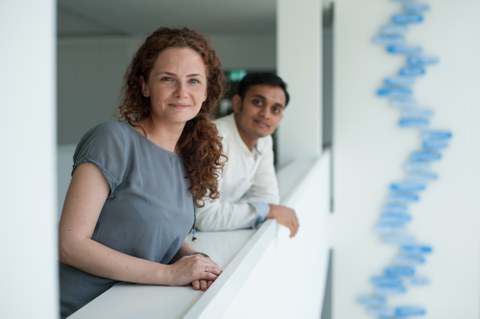TUD Young Investigators
Table of contents
Goals & Benefits
Our Objectives
The “TUD Young Investigator” status strengthens excellent, independent junior research group leaders (such as ERC-Starting Grant, Emmy Noether) by fostering their integration into the faculties and offering a qualification program FAST FORWARD tailored to their particular needs.
This scheme aims to counteract the structural disadvantages sometimes experienced by this group of researchers due to their lack of a defined status and inadequate or nonexistent connection to a faculty.
Your Rights
The status is awarded for a limited time and entails the following rights:
Every “TUD Young Investigator” will
- choose a TUD university professor as a mentor and direct contact,
- be accepted by the faculty as an assessor and examiner in doctoral procedures, particularly concerning the dissertations they (co-)supervise,
- participate in teaching,
- be integrated into their respective faculty, including the possibility to attend public parts of Faculty Council meetings as a guest,
- get the opportunity to participate in a range of training exclusively designed to address the needs of academics in this qualification phase.
Information on the application process
Who can apply?
- Junior research group leaders with fixed-term contracts with the TU Dresden or a partner institution of the DRESDEN-concept,
- with own budget and staff responsibility,
- who are academically independent and without affiliation to a professor,
- who heads a research group with at least two academics (excluding the head).
- In addition to a completed doctorate with a grade of at least "excellent" (magna cum laude), evidence of performance suitable for postdoctoral lecturer qualification (habilitationsadäquate Leistungen ) is required.1
How does the application process work?
Making an application to the University’s Rectorial Board for the award of
TUD Young Investigator status requires the support of
- the respective Faculty and,
- the mentor (a member of the Faculty) of your choice.
To determine if a respective faculty at the TUD is willing to admit someone as a Young Investigator, interested candidates should initially contact the relevant faculty dean.
Application Documents
- Application for the “TUD Young Investigator” status (Download)
- Agreement with the Faculty (Download)
Affiliation with two faculties
An interdisciplinary affiliation with two faculties is, in principle, an option. In this case, both faculties must endorse the application. Both faculties should agree with the TUD Young Investigator.
- An interdisciplinary offer should ideally encompass integration into teaching, typically involving a total of two SWS.
- Individual arrangements between the Faculty and the TUD Young Investigator are encouraged and should be outlined in the proposal/agreement.
- The scientific qualification and development of the profile of the TUD Young Investigator should always be in focus and not be impaired.
After reviewing the application and the faculty council's vote, the faculty forwards all signed application documents, along with the Dean's written statement, to the Rectorate of TU Dresden.
Statement of the Faculty/Dean (Download)
The TUD Young Investigator Status is awarded for a limited period. It is correlated with the duration of the independent junior research group or ends when the TU Young Investigator leaves the TUD or is appointed to a professorship.
Only with the faculty's agreement and written statement can an extension for a maximum of one additional year beyond the duration of the junior research group be granted.
Application for extension of the TUD Young Investigator Status (download)
FAST FORWARD | Qualification Program
Our Qualification Program FAST FORWARD is exclusively designed for
TUD Young Investigators.
Good Scientific Practice in Doctoral Supervision | 3 Online Modules
- Monday, January 26, 2026 | 1:00 - 5:30 p.m.
From the research process to its product: documenting the research process and managing data - Monday, 23rd February 2026 | 09:30 a.m. – 12:30 p.m.
From the research process to its product: publishing, contributing, and accountability - Monday, 9th March 2026 | 1:00 - 5:30 p.m.
Misconduct in research and how to deal with it
Doctoral Supervision | Online
- Thursday, March 19, 2026 | 02:00 - 5:00 p.m.
- Thursday, March 26, 2026 | 09:30 a.m. - 12:30 p.m.
*Short-term changes reserved
The following workshops are offered on a yearly basis:
- Faculty recruitment at German Universities: Berufungsverfahren
- How to supervise doctoral researchers
- Good Scientific Practice
- Power Games and Micropolitical Competence in Academia
More workshops offered to date:
- Fachkompetenz ist (fast) alles –
Kluge Selbstvermarktung, ein unverzichtbares Supplement - Leadership in der Wissenschaft: Teams führen & Promovierende betreuen
- Leadership in der Wissenschaft: Teams stimmig führen
- Power Games and Micropolitical Competence in Academia
- Research-oriented Learning and Teaching
- Interdisciplinary Idea Development in the World of Projects
- Status Communication in Academia
- Growing into Leading a Research Group | Online
Networking Events
In addition to the workshops, various event formats offer an excellent opportunity to strategically expand one's scientific network and swap expertise with other research group leaders.
- Mensa Meet Up
- Regulars' Table
- Summer Party of the Graduate Academy
TUD Young Investigator | Overview
School of Science
DR. MARKO BRANKATSCHK
TU Dresden | Biotechnology Center (BIOTEC)
..........................................................................
The Faculty of Biology is one of five faculties of the School of Science at TU Dresden.
It is home to the four departments of botany, genetics, microbiology, and zoology, and hosts 13 chairs.
DR. RICO FRIEDRICH
TU Dresden
PD DR. TOBIAS A. F. KÖNIG
Leibniz Institute of Polymer Research Dresden
DR. ELISHA KRIEG
Leibniz Institute of Polymer Research Dresden
DR. FABIAN PAULUS
Leibniz Institute for Solid State and Materials Research Dresden
DR. NATALIA MAYORDOMO HERRANZ
Helmholtz-Zentrum Dresden-Rossendorf
DR. CHRISTIAN ROßNER
Leibniz Institute of Polymer Research Dresden
DR. ETERI SVANIDZE
Max Planck Institute for Chemical Physics of Solids
DR. MINGHAO YU
TU Dresden
...........................................................................
The Faculty of Chemistry and Food Chemistry is one of the five faculties of the field of Mathematics and Sciences.
It comprises seven subject areas with 23 chairs.
DR. ALIAKSEI CHARNUKHA
Leibniz Institute for Solid State and Materials Research Dresden (IFW)
DR. CLAIRE DONNELLY
Max-Planck-Institute for Chemical Physics of Solids
DR. OLEG JANSON
Leibniz Institute for Solid State and Materials Research Dresden (IFW)
DR. LUKAS JANSSEN
TU Dresden
DR. FRANK SIEGERT
TU Dresden
DR. URI VOOL
Max Planck Institute for Chemical Physics of Solids
..........................................................................
The Faculty of Physics benefits from broad international cooperation and a unique multitude of local external partners in the DRESDEN-concept network.
Experimental and theoretical research focuses on condensed matter physics, particle and nuclear physics, complex quantum systems, and biophysics.
At present, there is no TUD Young Investigator at this faculty.
..........................................................................
The Faculty of Psychology considers itself to be an empirical human science with a focus on scientific experiments. Excellent research infrastructure and internationally renowned teams also offer young scientists the best start to their careers.
The Faculty of Psychology maintains a number of collaborations with other disciplines (e.g. neuroscience, psychiatry, genetics, occupational science, business, economics, education, IT, and philosophy).
TÜRKÜ ÖZLUM ÇELİK
DR. AIDA MARAJ
..........................................................................
The Faculty of Mathematics, with its 27 professors, is one of the most significant mathematical departments in Germany.
A broad research spectrum with several ERC grants, DFG projects, and participation in Clusters of Excellence, Collaborative Research Centers, and Graduate Schools characterizes it.
Thus, it is central to TU Dresden's various Research Priority Areas and a connecting link between numerous interdisciplinary projects.
School of Engineering Sciences
DR. SARAH GAGGL
TU Dresden | International Center for Computational Logic
..........................................................................
The Faculty of Computer Science is one of the largest educational institutions for computer science in Germany.
Students can choose from 12 different courses of study and graduate either with a Bachelor's, Master's, state examination, or Diploma—the latter proving to be a rare feature in Germany by now. This wide range of choices is complemented by international master programs and various structured Ph.D. Programs.
DR SASCHA HEITKAM
TU Dresden | Helmholtz-Zentrum Dresden-Rossendorf (HZDR)
DR IGOR ZLOTNIKOV
TU Dresden | B CUBE – Center for Molecular Bioengineering
..........................................................................
For more than 180 years, the Faculty of Mechanical Science and Engineering has been providing research and teaching in the service of technology for people. With nearly 4900 students, it is the largest faculty at TU Dresden.
The six courses of study: mechanical engineering, process engineering and natural product engineering, materials science, textile and clothing technology, mechatronics, and regenerative energy systems combine a lot of specialization areas. They range from general mechanical engineering, lightweight construction, aerospace engineering, bioprocess engineering or food technology are only a few of the offered fields of study which can be chosen from depending on the course of studies.
DR.-ING. E.-F. MARKUS VORRATH (NÉE HENKE)
..........................................................................
The Faculty of Electrical and Computer Engineering comprises 29 chairs and one junior professorship. The faculty's activities in teaching and research are correspondingly varied and cover the entire range of this area.
The faculty has an excellent network not only with international universities and research institutions but also with industry.
School of Civil and Environmental Engineering
At the moment, there are no TUD Young Investigators at this faculty.
...........................................................................................................................................
Since the 2010/2011 winter semester, the Faculty of Architecture has offered the reformed Architecture Diploma, as well as and the Landscape Architecture Bachelor and Masters degree programs.
It is also possible to obtain a dual degree in Architecture.
There are currently no TUD Young Investigators at this Faculty.
...........................................................................
The Faculty of Civil Engineering offers it's approximately 1,800 students in six specializations a solid and excellent education.
19 professors and more than 150 scientific staff research and teach at eleven institutes.
PROF. DR. MARTINA ARTMANN
Professorship Green Infrastructure | Weihenstephan-Triesdorf University of Applied Sciences & Leibniz Junior Research Group: Urban Human-Nature Resonance for a Sustainability Transformation | IOER
DR MARTA MARKIEWICZ
TU Dresden
..........................................................................................................................................................
The profile of the Faculty of Environmental Sciences is unique in Germany and also strongly international. It unites three essential environmental science fields under one umbrella, and this interdisciplinary, international approach enables significant synergies.
At the moment, there are no TUD Young Investigators at this faculty.
...........................................................................
More than 200 scientists research and teach at seven institutes and 20 professorships. The Faculty of Transport and Traffic Sciences offers six own study programs, including the diploma degree in Transport Engineering, the bachelor degree in Transport Economics, and four master programs.
At the moment, there are no TUD Young Investigators at this faculty.
..............................................................................................................................................
The Faculty of Business and Economics counts around 2.500 students. The spectrum of degrees offered is especially broad, with two Bachelor's programs (Business and Economics, Business and Economics Education), two Diploma programs (Industrial Engineering, Wirtschaftsinformatik), and five Master's programs (Business Administration, Economics, Business and Economics Education).
School of Medicine
DR. HAYDER AMIN
Deutsches Zentrum für Neurodegenerative Erkrankungen (DZNE)
(German Center for Neurodegenerative Diseases)
DR. DARJA ANDREEV
TU Dresden | Center for Regenerative Therapies Dresden (CRTD)
DR. JIRI EITLER
TU Dresden
DR. ANKE FUCHS
TU Dresden | Center for Regenerative Therapies Dresden (CRTD)
DR. NATALIA RODRIGUEZ-MUELA
Deutsches Zentrum für Neurodegenerative Erkrankungen (DZNE)
(German Center for Neurodegenerative Diseases)
DR. JAMES PETER SÁENZ
TU Dresden | B CUBE – Center for Molecular Bioengineering
DR. TATIANA SANDOVAL GUZMÁN
TU Dresden | Center for Regenerative Therapies Dresden (CRTD)
DR. ANNA TAUBENBERGER
TU Dresden | Biotechnology Center (BIOTEC)
...........................................................................
The School of Medicine of the TU Dresden comprises the high-performing Faculty of Medicine Carl Gustav Carus.
The innovative, close-to-the-patient teaching and the faculty’s internationally renowned, cutting-edge research can only be implemented through co-operation with the University Hospital Carl Gustav Carus.
The exceptional scientific environment in Dresden and the numerous international collaborations are further decisive factors for the positive development of the University of Medicine in Dresden.
School of Humanities and Social Sciences
...........................................................................
The Faculty of Education is the academic home of teaching, research, and studies for the entire spectrum of educational sciences.
The Faculty of Education is one of the largest Faculties at TU Dresden in terms of both enrolled and new students.
Dr. Manès Weisskircher
Institut für Politikwissenschaft | TU Dresden
...........................................................................
The Faculty of Arts, Humanities and Social Science is characterized by a broad range of subjects from humanities and social sciences, offering multi-perspective, methodologically diverse, and socially highly relevant teaching and research, which at the same time is internationally networked and firmly anchored in the social and cultural life of the Culture Capital Dresden.
There are currently no TUD Young Investigators on this Faculty.
...........................................................................
The Faculty of Linguistics, Literature, and Cultural Studies at TU Dresden was established in 1993. It currently comprises 23 chairs (including deputies). The Faculty has around 190 academic employees, including the Teaching Centre for Languages and Regional Studies and the Central European Centre for Political, Economic, and Cultural Studies. More than 4000 students are enrolled in the Faculty's courses.
TUD Young Investigator | Alumni
- PROF. DR. MAREIKE ALBERT
Center for Regenerative Therapies Dresden (CRTD) | TUD - PROF. DR. SIMON ALBERTI
Cellular Biochemistry | TU Dresden - PROF. DR. MARTINA ARTMANN
Professorship Green Infrastructure | Weihenstephan-Triesdorf University of Applied Sciences & Leibniz Junior Research Group: Urban Human-Nature Resonance for a Sustainability Transformation | IOER
- DR. CHRISTIAN BÖKEL
Ulm University
- PROF. DR. LARS BORCHARDT
Inorganic Chemistry | Ruhr-University Bochum - PROF. DR. VOLKER BUSSKAMP
Degenerative Retinal Diseases | University of Bonn -
PROF. PhD. Eng. CARLO V. CANNISTRACI
Department of Biomedical Engineering | Tsinghua University, Beijing, China
- PROF. DR. ÜNAL COSKUN
Paul-Langerhans-Institut Dresden (PLID) | TU Dresden - PROF. DR. ERIKA COVI
Cognitive Systems and Materials Center | University of Groningen - PROF. DR. ILONA CROY
Clinical Psychology | Friedrich Schiller University Jena -
Department of Chemistry | The University of Hong Kong
- PROF. DR. ANDRÉ ECKARDT
Theoretical Physics | TU Berlin - JUN.-PROF. DR.-ING. ANETTE ELTNER
Geosensor System | Technische Universität Dresden - DR. KATERINA FALK
Project Management | Infineon R&D - PROF. DR. ELISABETH FISCHER-FRIEDRICH
Heisenberg Professor for Mechanics of Active Biomaterials | TU Dresden
- PROF. DR. BENJAMIN FRIEDRICH
Heisenberg-Professorship for Biological Algorithms | TU Dresden
-
DR. ION COSMA FULGA
Leibniz Institute for Solid State and Materials Research Dresden (IFW) -
PROF. DR. ELENA GATI
Max Planck Institute for Chemical Physics of Solids | TUD Honorary Professor - PROF. DR. INGMAR GLAUCHE
Institute for Medical Informatics and Biometrics | TU Dresden - PROF. DR. DOROTHEA GOLZE
Professor für Theoretical Chemistry | University of Würzburg - PROF. DR. JOHANNES GOOTH
Senior Data Scientist | Tchibo
University of Bonn (until 2024) - PROF. DR. MICHAEL HILLER
LOEWE-Zentrum für Translationale Biodiversitätsgenomik (LOEWE-TBG) - DR. CASPAR HOPFMANN
Deutsche Telekom Chair of Communication Networks | TU Dresden - DR. FLORIAN JUG
Head of Image Analysis Facility | Fondazione Human Technopole (Mailand) - PROF. DR. DOMINIK KRAUS
High Energy Density Physics | University of Rostock - PROF. DR. MARKUS KRÖTZSCH
Knowledge-Based Systems | TU Dresden - PROF. DR. JAKUB LIMANOWSKI
Biological Psychology | Universität Greifswald - PROF. DR. FRANZISKA LISSL
Applied Polymer Physics | TH Hamburg - PROF. DR. AXEL LUBK
Electron Optics | TU Dresden, IFW Dresden
- DR. JÖRG MANSFELD
Institute of Cancer Research (ICR) in London, UK - PROF. DR. MARIANA MEDINA SÁNCHEZ
Ikerbasque Research Professor and Group Leader | CIC nanoGUNE | Spain - DR. TOBIAS MENG
Team leader in quantum technology research | JoS QUANTUM - JUN-PROF. SANDER MÜNSTER
Digital Humanities | Friedrich Schiller University Jena - PROF. DR. CAROLINE MURAWSKI
Biomedical Sensor Technology | TU Dresden
-
DR. SOLVEJG NITZKE
Allgemeine und Vergleichende Literaturwissenschaft | Ruhr-Universität Bochum - PROF. DR. FRANK ORTMANN
Theoretical Methods in Spectroscopy | TU München - PROF. DR. MAREIN RAHN
Experimental Physics | Augsburg University - PROF. DR. MARCO SALVALAGLIO
Professorship (apl.) of Computational Materials Science | TU Dresden - Prof. DR. CHRISTINA SCHEFFLER
Chair of Polymers in Construction at the TU Dresden and
Leibniz Institute of Polymer Research Dresden (IPF) -
PROF. DR. MICHAEL SCHLIERF
Molecular Biophysics | TU Dresden -
PROF. DR. THORSTEN-LARS SCHMIDT
Assistant Professor for Experimental Biophysics | Kent State University (USA)
-
DR. ANDREAS SCHNEEMANN
ENS Paris (ab 03/26) -
DR. HELMUT SCHULTHEISS
Helmholtz-Zentrum Dresden-Rossendorf (HZDR) -
PROF. DR. ABHINAV SHARMA
Theoretical Physics, University of Augsburg
Leibniz Institute of Polymer Research Dresden e. V. -
PROF. DR. JULIANE SIMMCHEN
Pure and Applied Chemistry | University of Strathclyde, Glasgow (GB) - PROF. DR. STEPHAN SPEIER
Pancreatic Islet Physiology | TU Dresden - DR. CATALIN STEFAN
TU Dresden
PROF. DR. JULIAN THIELEOrganic Chemistry | Otto-von-Guericke-Universität Magdeburg
-
DR. MAXIMINA YUN
CIMR-Chinese Institutes for Medical Research | Beijing | China -
Stochastic processes in cells and tissues
Scuola Internazionale Superiore di Studi Avanzati | Trieste, Italy -
University of Freiburg
Get in Touch
 © Claudia Wittmann
© Claudia Wittmann
Deputy Head of Unit
NameAngela Böhm M.A.
Career Development , TUD Young Investigators, PR & Events
Send encrypted email via the SecureMail portal (for TUD external users only).
Visiting address:
Graduiertenakademie Mommsenstraße 7
01069 Dresden
Office hours:
Appointments by arrangement
Fußnoten
-
The quality and quantity of publications, documented teaching quality, mentoring of early-career researchers, and success in securing third-party funding are all considered appropriate for habilitation.
The criteria are defined and weighted differently across the various disciplines. The respective faculty decides whether these are present.








